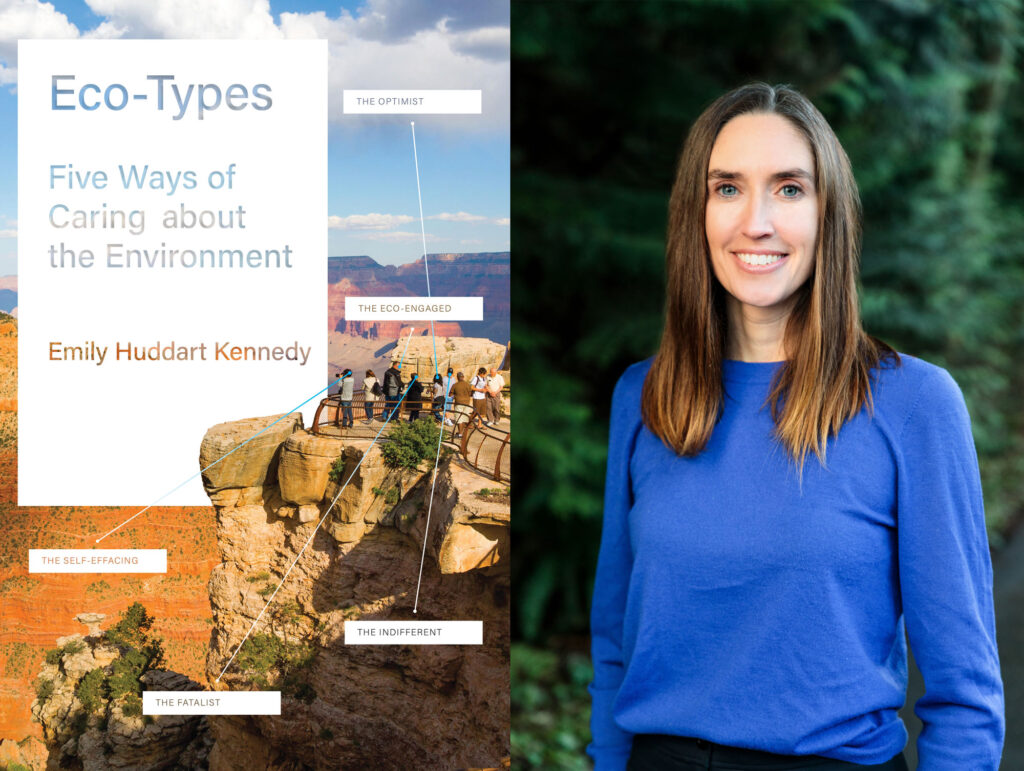
In her new e book Eco-Varieties: 5 Methods of Caring in regards to the Surroundings, Dr. Emily Huddart Kennedy, an affiliate professor in UBC’s college of arts, proposes 5 new classes to explain how individuals work together with the atmosphere.
Q&As
In terms of environmental politics there’s an inclination to affiliate the Left as pro-environment and the Proper as anti-environment, however a UBC sociologist says this polarization would possibly truly decelerate our collective progress on environmental points.
In her new e book Eco-Varieties: 5 Methods of Caring in regards to the Surroundings, Dr. Emily Huddart Kennedy, an affiliate professor in UBC’s college of arts, proposes 5 new classes to explain how individuals work together with the atmosphere.
The work is predicated on analysis she carried out from 2015 to 2017 the place she carried out over 60 interviews and carried out survey analysis in all 50 U.S. states.
We spoke with Dr. Kennedy about her work.
Why had been you drawn to this work?
I began this undertaking to grasp the place of the atmosphere in individuals’s lives—with the belief that I’m not on the market to seek out out who cares in regards to the atmosphere, however actually how individuals care in regards to the atmosphere.
What are the 5 completely different ‘ecotypes’ you discovered?
- The eco-engaged, who are typically politically liberal. They really feel tremendous intensely in regards to the atmosphere they usually’re very frightened. They suppose all people ought to do every little thing that they’ll to guard the atmosphere, they usually suppose that they’re doing a very good job.
- The self-effacing, who share the eco-engaged’s traits and considerations besides they’ve a powerful sense of doubt in their very own capability to guard the atmosphere. They really feel actually responsible and unhappy.
- The optimists, who are sometimes politically conservative. They’re assured of their relationship with the atmosphere, doubt the severity of environmental issues and resent insinuations that they don’t care.
- The fatalists, who’re pessimistic about environmental decline and really feel little duty to undertake environment-friendly habits as a result of they imagine that firms and governments maintain management.
- And, the detached, who’re the smallest proportion of the pattern. They’re individuals who have a low stage of curiosity within the atmosphere. They don’t really feel able to making a choice about how severe environmental points are as a result of they only really feel so ill-equipped to make that type of a prognosis.
Is that this about de-politicizing the strategy to the atmosphere?
I see this much less as de-politicizing and extra like taking a step to maneuver us away from polarization.
Ever because the Nineteen Seventies once we began individuals’s relationships to the atmosphere, their concern, engagement and behaviors, we’ve at all times seen political variations. However even within the Nineteen Seventies, when these variations existed, we additionally handed a number of the extra complete laws than ever earlier than or ever since.
I feel that political variations can exist alongside passing proactive environmental coverage. And I see this as a chance to have a look at some vital frequent floor that we’ve got. The frequent floor is that everybody cares in regards to the atmosphere.
Why is it beneficial to interrupt this down past simply left versus proper?
It has to do with the best way we’re speaking environmental points to most people. Whether or not it’s messaging on voting or way of life selections, I feel that a variety of that messaging tends to essentially communicate to the extra left-leaning eco-engaged and self-effacing ecotypes. Environmental messaging typically doesn’t communicate to the optimists, the fatalists or the detached. So, this new framework may assist in creating appeals across the environmental motion that would interact extra conservatives in extra to liberals.
May this work assist the best way we work together with one another in regards to the atmosphere?
I feel this might assist construct consensus on the environmental motion throughout classes of political distinction. When you encounter somebody who you sense has a unique orientation to the atmosphere than you have got, this might hopefully assist you to not soar to make an ethical character judgment of that particular person, however as a substitute really feel some curiosity about why they’ve the connection to the atmosphere that they do.



